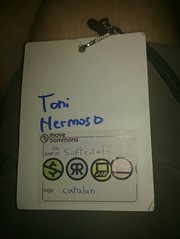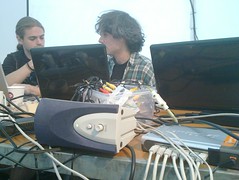Are you moonlighting?
Submitted by toniher on
A few weeks ago I finally had my dissertation (PhD) defence. Below you can see the shown slides (in Catalan), trying to touch in around 3/4 hour many of the different involved works.
One of the mentioned topics was protein moonlighting (or multitasking), that is, the property that some protein molecules may have additional functions or roles apart from the one that is primarily annotated or known. As example, the group in which I worked during my PhD studies is actually keeping an exhaustive list of these cases.
This usage can be considered as a kind of metaphor of the original moonlighting term. As it can be read in Urban Dictionary, it refers to the fact of having an additional job, normally during moonlit hours (at night).
For a non-native English speaker it's always hard to know how popular certain words or expressions are. It was funny to learn that at least this word seemed to exist already during the 1970s in the USA. However, as we can see during a conversation of the main character of Taxi Driver, not all people may have been fully familiar with it.






